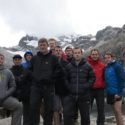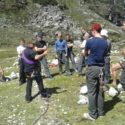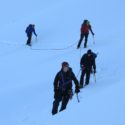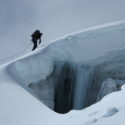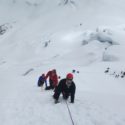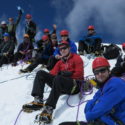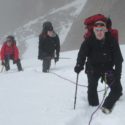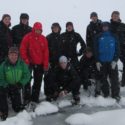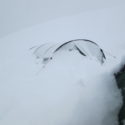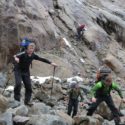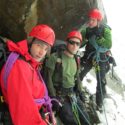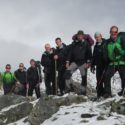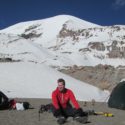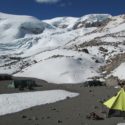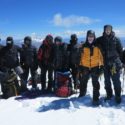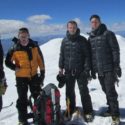In the Spring of 2014, twelve soldiers from 101 (City of London) Engineer Regiment (Explosive Ordnance Disposal), many of whom had recently returned from serving in Afghanistan, and East Midlands Universities’ Officer Training Corps, completed a 30-day expedition to carry out high altitude mountaineering in the Peruvian Andes, culminating in the successful ascent of Coropuna (6425m), Peru’s 3rd highest mountain. Other than the two instructors, the team consisted entirely of other ranks and junior non-commissioned officers. A key tenet of the expedition was to introduce novice and intermediate mountaineers to alpine mountaineering adventurous training with the hope of inspiring the soldiers to lead similar expeditions in the future. The participants were Maj John Tolan, Capt Damian Warren, Cpl Jim A’Hara, Cpl ‘Chuck’ Berry, LCpl Ant Bayliss, LCpl Tom Eaves, Spr ‘Benny’ Hill, Spr Dan Sheldon, Spr Chris Wagstaff, Spr Sam Roslyn, Spr Matt Dalley and Spr Jordan McDonagh.
The team undertook thorough preparatory training where all members gained the winter mountain foundation qualification – basic winter mountaineering skills (using crampons and ice axes while moving over snow-covered terrain). Additionally, all of the team completed a Scottish training exercise (based at Inverness), on which three remote Munros, Scottish mountains over 3000ft, were climbed in typically adverse Scottish conditions. During the main expedition to Peru the team completed an acclimatisation phase with everyone reaching heights over 4600m, just 200m below the height of Mont Blanc. The acclimatisation treks were set in rural Peruvian locations bringing home the hardship of the local people who live off the land on the most incredible gradients. The indigenous Peruvians could always be spotted in their colourful attire between the maze and corn fields, normally accompanied by a menagerie of animals, key to their livelihood.
The first mountain phase saw the team move to the steep-sided and jagged-walled Ishinca valley. Alpine skills were taught by Major Tolan, the senior instructor who has been to the valley many times before, Captain Warren who was both the expedition leader and alpine mountain instructor and 2 local guides. The lessons included crevasse rescue, abseiling, moving together while roped up and further practice in wearing technical equipment – ice axes and crampons. Towering above base camp was a snow covered glaciated mountain called Ishinca (5530m). The team set off to climb the mountain which, being early in the season, had deep snow and very few previous tracks to follow. After 9 hours of negotiating crevasses, ice cliffs and steep snow slopes the entire team reached the summit of Ishinca, a really impressive feat just nine days into the expedition.
After the initial success of climbing Ishinca the team’s morale was high and the plan for the next phase was to climb Copa, a huge 6000m mountain. Unfortunately, significantly high snowfall resulted in an immediate escape to the valley floor between two nearby avalanches. Notably, the team made it to the high camp at 5200m carrying full mountain packs crossing boulder fields and ascending a lose scree gulley – all credit to the team’s determination to climb a 6000m mountain. The unstable snowpack and prediction of continued dangerous conditions resulted in a quick adjustment of the plan, forcing the team to move to Southern Peru to attempt the volcanic giant, Coropuna, 6425m.
The unexpected move required the team to be flexible and change objective to an unplanned mountain. The move from Northern Peru to the town of Arequipa in Southern Peru required over 24 hours of bus travel covering nearly 2000km. The team then moved in 4×4 vehicles to a base camp in the volcanic wasteland below the slopes of the now extinct volcano. The following day we ascended through moraines and giant boulders to a high camp at 5400m. The human body will never fully acclimatise to this altitude and in such an inhospitable location plants and animals cannot survive. It is never pleasant waking up at 0030 hours to start the day, but at 5400m in a frozen tent with significant wind chill it requires some sort of motivation – luckily the challenge of scaling Peru’s 3rd highest mountain was just what was required! The climb from high camp immediately started on ice-hard snow with just the glow of head torches and some moonlight to find sound foot placements. Shortly into the climb crampons were donned and the team moved onto steeper terrain to ascend through ice covered rock buttresses; it was probably just as well it was still dark.
At the end of the mixed snow and rock ridge the sun was beginning to rise, bringing much needed warmth to the team struggling with the freezing temperatures – water bottles were frozen solid, down jackets and even full balaclavas were being worn. By this stage, movement was slow and methodical, requiring immense perseverance and the team overcame fatigue and hardship beyond the levels ever experienced by the soldiers before. It all paid off and the whole team were standing on the summit of Coropuna – a truly incredible and hard won experience.
With military operations likely to focus on the prevention of conflicts and overseas nations’ capacity building, there were many cultural and geographical similarities with the remote Peruvian regions visited to those likely to be encountered in the future, making the experience even more valuable for the soldiers present. It not only improved fitness but also the soldiers’ understanding of cultural differences and their ability to operate in small teams in remote and hostile environments. The expedition was both mentally and physically challenging and increased the team’s effectiveness as soldiers preparing to go on future operations by fostering qualities of team spirit, robustness and initiative.
Huge thanks given to the very significant support of the Ulysses Trust, without such kind and generous support, expeditions of this nature would not be possible.
Captain Damian Warren
Expedition Leader
101 (City of London) Engineer Regiment (Explosive Ordnance Disposal)

